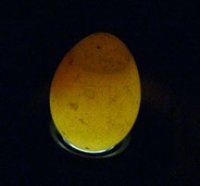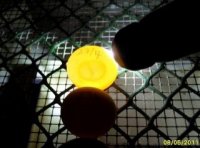We (my wife and I) have a pair of rainbow lorkeet's who had their first cluch but after 5 days they were not sitting on the eggs. We moved the eggs into our custom-made brooder, added a bowel of water and are maintaining the temperature at around 37-38C (99F) as best as we can. We have now been incubating the eggs for 5 days and while one of them has no noticeable change the other clearly has had some activity as it has developed a red ring. Prior to having a red ring it had a dark spot (around day 3). I did some searches on Google and am finding conflicting information regarding a red ring. Some say veins formed inside the red ring attaching to a dark spot in the center, while others are saying the red ring indicates the egg has died and the red ring is due to bacteria and the blood moving away from the embryo after it died. The three pictures below are of the egg which has the red ring.
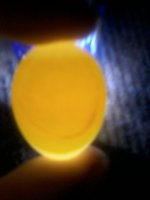
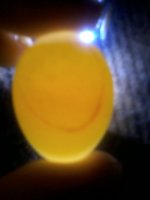
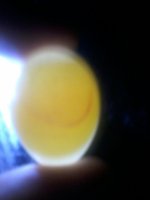
Is this egg alive? Is it safe to keep the other egg which doesn't appear to be fertilized with this egg?
This is my first time trying to incubate an egg and the first time our rainbow lorikeets have laid eggs. I've yet to seen any "spider veins" in either of the eggs which is what I would expect to see but I am unable to find any images online of candled lorikeet eggs.



Is this egg alive? Is it safe to keep the other egg which doesn't appear to be fertilized with this egg?
This is my first time trying to incubate an egg and the first time our rainbow lorikeets have laid eggs. I've yet to seen any "spider veins" in either of the eggs which is what I would expect to see but I am unable to find any images online of candled lorikeet eggs.


